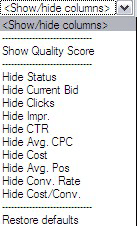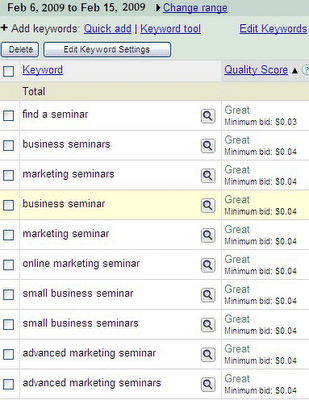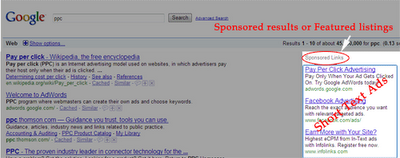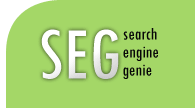Before proceeding to know how to get higher Quality Scores, l, we need to understand how a quality score is calculated. Simply stated, a Quality Score is calculated every time your keyword matches a search query - or in other words, every time your keyword has the potential to trigger an ad.
Then, it is necessary to know why Quality Score is important. The Ad Rank or the position an ad shows on a search result or across the content network - is determined by maximum cost per click and quality score. There is a widely accepted formula to arrive at the ad rank and the formula may be stated thus:
Ad Rank = [(keyword / ad group] quality score) X Max CPC] |
Though somewhat confusing, one needs to understand that for search purposes, the keyword quality score is used and for content the ad group quality score is used. For keywords, every keyword has a quality score fixed to it. So, it is important to keep in mind when talking about ad copy as it will be associated with multiple keywords.
Here's the step by step instructions on adding your quality score column to your keyword view.
First, navigate to the keywords in your AdGroup. Next, click on the 'customize columns' option seen below.

This will let you see the drop down menu:

Click on 'Show Quality Score'. Your AdGroups will now look like this

A keyword's Quality Score influences its cost-per-click (CPC) that is, how much the advertiser is charged for a click on the ad when it is triggered by a keyword. The higher a keyword's Quality Score, the lower is its Cost per Click (CPC), and vice versa.
Quality Score also determines, in a way, if a keyword is eligible to enter the ad auction that occurs when a user enters a search query. Usually, the higher the Quality Score, the lower will be the applicable costs and the better your ad position. Every time one of your keywords matches a search query, the combined Quality Score and cost-per-click (CPC) bid is evaluated to see if it's eligible to enter the ad auction. Keywords with a higher Quality Score will be eligible to enter the auction more easily and at a lower cost.
On the keyword analysis page, there will be a metric called 'first page bid estimate,' that means the CPC bid required for your ad to appear on the first page of Google search results assuming the search query exactly matches your keyword. The estimate is obviously based on the Quality Score as well as the advertiser's competitors for that keyword. However, it is to be noted that succeeding in your first page bid is no guarantee of your ad placement which will depend on Quality Score, your CPC bid, your budget and user and advertiser behavior.
It is to be understood that ads are positioned on search pages and content pages depending on their Ad Rank. The ad with the highest Ad Rank obviously appears in the first position, and the other ads appear in the order of their rankings. For Google, to put it simply, the Ad Rank is determined by your keyword's Quality Score and (CPC) bid.
Labels: pay per click, quality score
Microsoft adcenter - A beginner's guide to Microsoft Pay per click
Written by seg
@ 4:37 AM
permanent link on
| |
0
comments
As most of us are aware, Pay per Click (PPC) search engine marketing is an advertising strategy where you, as an advertiser, pay a search engine every time a potential customer clicks on your ad. These ads appear either on search engine results pages or on sites within a search engine's network of partners. The growth of the search industry worldwide has resulted in a big market for paid search advertising and hence most search engines have developed some type of PPC related, of course, to performance.
To appear in the PPC results, advertisers sign up for the PPC program and create short text ads, image ads or videos describing their product or services shown on their site in a way that will tempt searchers to visit it. While setting up the program, an advertiser will determine which trigger keywords/phrases they wish to bid on and how much they are willing to pay when a visitor clicks on their ad.

If you study at a search engine results page (SERP), you will be able to distinguish between search results that are regular organic search listings and PPC search results which are actually paid advertisements. These paid ones are generally listed under "sponsored results" or "featured listings" and consist of specially designed text, image or video ads that are triggered to display when your target keywords are used in a search query.
 Microsoft AdCenter (formerly MSN adCenter) has brought out the latest PPC. Microsoft adCenter is the division of the MSN entrusted with the task of providing Pay Per Click advertisements. Microsoft has joined the Big Three league the other two being Google and Yahoo - develop its own system for delivering PPC ads.
Microsoft AdCenter (formerly MSN adCenter) has brought out the latest PPC. Microsoft adCenter is the division of the MSN entrusted with the task of providing Pay Per Click advertisements. Microsoft has joined the Big Three league the other two being Google and Yahoo - develop its own system for delivering PPC ads.
Strictly speaking, Microsoft is not a stranger tp PPC as till recently, all of the Microsoft ads displayed on the MSN search engine were supplied by Overture and later Yahoo!. MSN claimed a percentage of the ad revenue in return for displaying Yahoo!'s ads on its search engine. As search marketing expanded and presented great opportunities, Microsoft has now developed its own system, Microsoft adCenter, for selling PPC advertisements directly to advertisers.
This bid is the maximum amount you are willing to pay if any user searches for one of your keywords and clicks your ad. You can also increase your bid if you wish to reach specific audience target that fits your buyer profile. Generally, the higher the bid, the more likely their ad will show above their competitor's
It is good to know that Microsoft sets store on the ability to build brand awareness with their PPC program, permitting the continued exposure of your brand to a wider audience, regardless how many clicks your ad attracts. This is an important feature of most PPC programs though Google or Yahoo is reluctant to use this strategy.
Borrowing ideas from Google adWords, Microsoft adCenter avails the maximum amount an advertiser is willing to pay per click as well as the advertisement's click through rate (CTR) to determine how frequently an advertisement is shown. This dual operation is said to encourage advertisers to write effective ads and makes them advertise only on searches which are relevant to their advertisement.
Microsoft adCenter lets advertisers to target their ads by restricting their ads to a given set of locations. Similarly, adCenter allows advertisers to run their ads on select days of the week or at specific hours of day.
Labels: microsoft, Microsoft adcenter
Quality score 10/10 asking bid 5$ to be on front page
Written by Search Engine Genie
@ 1:13 PM
permanent link on
Tuesday, September 1, 2009
| |
0
comments
This is the 1st time i feel Google is becoming a bit greedy. One of our client has a quality score 10/10 for a keyword related to windows. I cannot reveal keyword or client site here. Yesterday when i noticed the campaign i saw a 10/10 quality score for a keyword. I was overjoyed because usually very high quality score will result is low bids. Bit it was disappointment for me :-(. Asking bid was above 5$ for 1st page display.
Is Google joking it wants us to have great quality score but ends up asking 5$ for 1st page though we have 10/10 quality score. Can anyone explain this? I personally feel this is some sort of glitch or just greediness on part of Google.
If they think 10/10 is not enough they should remove the quality score completely. ill provide screen shot soon. Right now my gmail is down and the adwords login information is in my account.
Labels: adwords ppc








